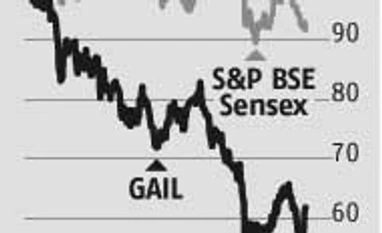The GAIL India stock has gained 10 per cent in the past three trading sessions and ended at Rs 309 on Wednesday. This rally is aided by a couple of positive news flows.
First, the company stands to be a key beneficiary of the draft hydrocarbon policy announced earlier this week. If implemented, this will free pricing of domestic gas (currently regulated), which would boost gas production. This means utilisation of GAIL and other gas pipeline companies could improve significantly over the next few years. GAIL has been operating its pipelines below 40 per cent utilisation for the past few quarters.
However, this policy is at a very early stage and benefits might accrue only gradually. Any improvement in pipeline utilisation will be a key positive. Second, Mumbai's sole authorised distributor of compressed natural gas (CNG) and piped natural gas (PNG) — Mahanagar Gas — has filed its draft prospectus on November 16, in which GAIL is looking to sell about 14 per cent stake (of its nearly 50 per cent shareholding).
The high cost of liquefied natural gas (LNG) sourced from Qatar-based Ras Gas at $12 per mBtu (million British thermal units) vis-a-vis the spot price of $7-8 an mBtu is a key monitorable. This is because GAIL might defer purchase of LNG under the contract and trigger off a “take or pay” (ToP) clause with the company.
Analysts at JPMorgan believe it is unlikely that the ToP will be implemented, citing a surge in global LNG supply and India's status as a key buyer. The negotiations are on with Ras Gas and the Street will watch closely. At Wednesday's closing price, GAIL trades at 10 times the estimated earnings for the 2017 financial year, also its historical average one-year forward price to earnings value. Thus, for the moment, the stock appears fairly valued.
First, the company stands to be a key beneficiary of the draft hydrocarbon policy announced earlier this week. If implemented, this will free pricing of domestic gas (currently regulated), which would boost gas production. This means utilisation of GAIL and other gas pipeline companies could improve significantly over the next few years. GAIL has been operating its pipelines below 40 per cent utilisation for the past few quarters.
However, this policy is at a very early stage and benefits might accrue only gradually. Any improvement in pipeline utilisation will be a key positive. Second, Mumbai's sole authorised distributor of compressed natural gas (CNG) and piped natural gas (PNG) — Mahanagar Gas — has filed its draft prospectus on November 16, in which GAIL is looking to sell about 14 per cent stake (of its nearly 50 per cent shareholding).
The high cost of liquefied natural gas (LNG) sourced from Qatar-based Ras Gas at $12 per mBtu (million British thermal units) vis-a-vis the spot price of $7-8 an mBtu is a key monitorable. This is because GAIL might defer purchase of LNG under the contract and trigger off a “take or pay” (ToP) clause with the company.
Analysts at JPMorgan believe it is unlikely that the ToP will be implemented, citing a surge in global LNG supply and India's status as a key buyer. The negotiations are on with Ras Gas and the Street will watch closely. At Wednesday's closing price, GAIL trades at 10 times the estimated earnings for the 2017 financial year, also its historical average one-year forward price to earnings value. Thus, for the moment, the stock appears fairly valued.
)